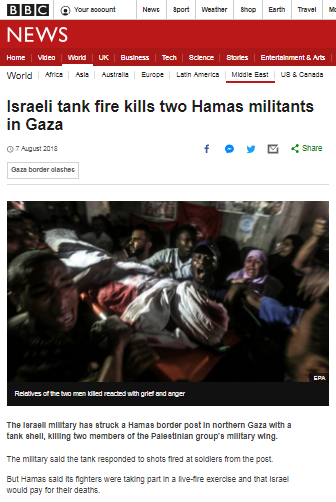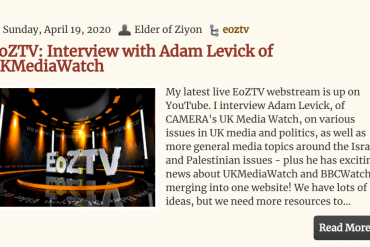Yolande Knell’s journalistic crusade against a section of the anti-terrorist fence near the Cremisan Valley has long been a permanent feature in BBC Middle East reporting and her latest contribution to that political campaign came on August 21st in an article which appeared on the BBC News website’s Middle East page under the title “Palestinian Christians urge help against West Bank barrier“.
Knell opens her article by telling readers that:
“Palestinian Christians are appealing for international support to oppose renewed construction of part of Israel’s West Bank barrier.
Residents of Beit Jala – a town along the planned barrier route – made the appeal at an open-air mass among centuries-old olive trees on Friday.
They have also been waging a long legal battle, backed by the Vatican.
The barrier will separate over 50 families from their land – but Israel says it is a vital security measure.” [emphasis added]
So BBC audiences learn that “renewed construction” of this particular section of the anti-terrorist fence (which began last week) “will separate over 50 families from their land”. That, however, is not true. The recent history of this case is as follows: [all emphasis added]
“On April 2, 2015, the High Court of Justice upheld the need for the construction of the security fence in the area on security grounds. That said, the Court found in favor of the petitioners regarding the proposed route of the security fence, and ruled that it may not separate between the Monastery and Convent and that the route must be crafted in consultation with the clergy, allowing both bodies to remain on the Palestinian side, preserving their territorial contiguity and their physical connection to the communities that they serve in the nearby villages.
Following and in line with this ruling, the Israeli authorities began work to construct 1200 meters of the security fence, excluding a 225 meter area in the vicinity of the Monastery and Convent in which no barrier will be constructed at this time. This gap enables the territorial contiguity of the monastery and convent, free approach by and to the local Palestinian population, and maintains for the Monastery unfettered access to their agricultural lands, thus respecting the High Court of Justice decision.
Following the initiation of this construction, the 37 Beit Jala residents petitioned the High Court and requested a contempt of court order against the State in the Cremisan Valley Case (HCJ 5163/13).
On July 6, 2015, the High Court of Justice dismissed the contempt of court petition. The High Court of Justice noted that the actions of the State at present do not negatively affect contiguity between the Monastery and the Convent, nor their access to their vineyards and farmlands. Moreover, access to the town of Beit Jala is also not affected, nor is the daily routine of the population in the area. Accordingly, the current construction of the barrier in the area which excludes the 225 meter gap, are in full compliance with the April 2, 2015 High Court of Justice decision on this matter.”
Obviously then neither the issue of access to agricultural lands nor the previously cited topic of separation between the convent and the monastery is the real reason why political activists are still opposing the construction of this section of the anti-terrorist fence.
Knell then throws some additional ‘reasons’ into her cocktail, including further promotion of the myth of locals ‘losing access to their land’ and an absurd claim relating to Palestinian Christians: [all emphasis added]
“The mayor of Beit Jala has written to diplomats from the European Union and the United States, asking them to put political pressure on Israel not to continue.
“We want people outside to come and say ‘enough is enough’,” says the mayor, Nicola Khamis. “Christians all over the world must stop being silent.”
“What Israel is doing here is against peace. It will prevent a two-state solution [to the conflict].”
Last year, Pope Francis met residents who stand to lose access to their land in the Cremisan Valley, when he visited nearby Bethlehem.
Foreign dignitaries have also expressed their concerns to Israeli authorities, listing the separation barrier among pressures that are pushing Christians to leave the Holy Land.”
Knell continues with the following obviously inaccurate paraphrasing of the Israeli side of the story:
“Israel says the barrier is needed in the valley as a security measure to protect the Jewish settlements of Gilo and Har Gilo.”
Despite the fact that legal status has no bearing on the need for security measures, she then inserts the standard BBC mantra:
“Settlements are considered illegal under international law, although Israel disagrees.”
As regular readers will be aware, the BBC has done little over the years to inform its audiences of the fact that the fence has proven to be effective in thwarting suicide bombers and other types of terrorist attacks and Knell’s half-hearted ticking of the context box does little to enhance audience understanding of the issue.
“Construction of the Israeli barrier began in 2002, during the second Palestinian intifada or uprising, after a series of suicide attacks.
In the Beit Jala area, at this time, there was shooting at the settlements.”
She then predictably inserts a specious claim regularly touted by the BBC over the last thirteen years:
“Palestinians believe the ultimate aim of the barrier – which includes stretches of high concrete walls and barbed-wire fences – is to grab land.”
Towards the end of the article readers are presented with the following opaque information which does nothing to clarify that Knell’s earlier allegations regarding access to land are inaccurate.
“In April, Israel’s High Court appeared to rule against proposed routes for the barrier in the Cremisan Valley, a local beauty spot filled with olive groves and orchards.
However, the court later said this prevented work only in a small area near a Salesian convent and school, and a monastery and winery.”
Knell ends her piece with the following hyperbole:
“Local church leaders – Latin Catholic and Greek Orthodox – have been involved in the campaign to prevent the construction of the barrier.
“When you kill the olive trees, you kill the people here,” said the Catholic priest, Faisal Hijazin, during the mass. “We pray for God to protect the olive trees, the land and the people.””
Seeing as they do not even get a mention in this report, it is obvious that the 1,100 Israelis actually killed between 2000 and 2006 and the thousands more maimed and injured by Palestinian terrorists are of much lesser concern to both the quoted priest and his BBC amplifier.
It of course comes as no surprise to those who have followed Yolande Knell’s self-conscription to this political campaign and others over the years to find such inaccurate, misleading and one-sided ‘reporting’ on the BBC’s website. Nevertheless, it is worth remembering that the BBC is supposedly obliged to “[b]uild a global understanding of international issues” by means of accurate and impartial reporting and that its editorial guidelines on accuracy state that “[t]he BBC must not knowingly and materially mislead its audiences”.
By telling readers that the renewed construction of the anti-terrorist fence near the Cremisan Valley “will separate over 50 families from their land”, Yolande Knell has done precisely that.
Related Articles:
BBC’s Yolande Knell ditches any semblance of impartiality
Knell’s follow up on Cremisan Valley marred by BBC mantras
Variations in BBC portrayal of fences, walls and barriers
Resources:
BBC News Online – contact details




